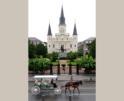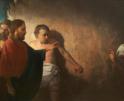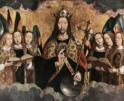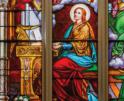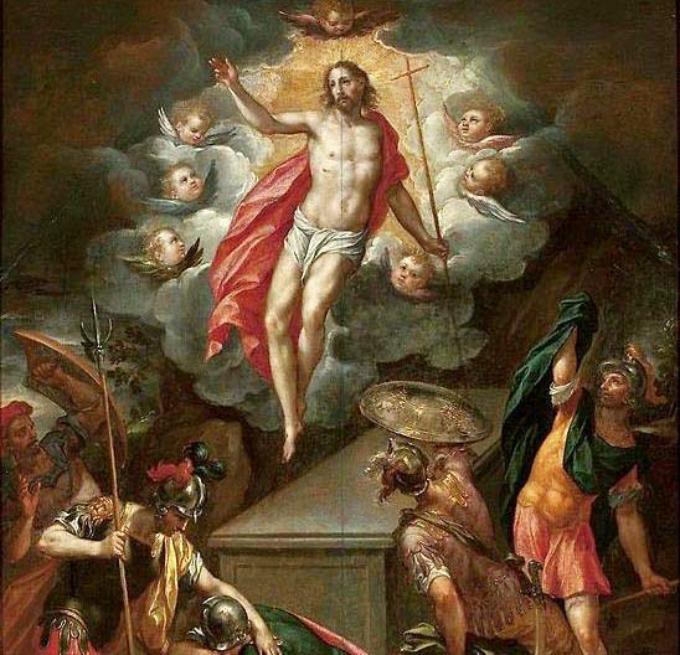
Faith
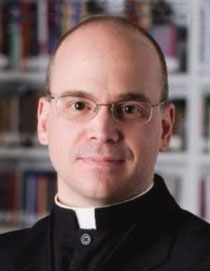
Grunow
"She hears, upon that water without a sound, a voice that cries, 'The tomb in Palestine is not the porch of spirits lingering. It is the grave of Jesus where he lay...'"
Somber words. One should say, inappropriate words for Easter Sunday.
They come from the American poet Wallace Stevens, and they are an excerpt from his poem "Sunday Morning." The poem is about a loss and lack of faith in the meaning of not only Easter, but every Sunday since then--for Sunday is enshrined with significance, not because it is a casual day of leisure, but because it is the day when Christ rose from the dead.
In Wallace Stevens' poem, faith in what the event of Christ's resurrection accomplished in history has been lost. The modern mind is content with the distractions of the news of the day, willing to accept that the frame of reference for life's meaning is limited to the cycles of nature, and is consoled by the promises of middle class prosperity. Sunday is a day to sleep in, or if rising early, to quietly sip one's coffee and enjoy a pastry or two.
One can expect nothing more. Blessed are those, at least in the context of Stevens' poem, who do not see--or even do see--and do not believe.
It is hard to get a sense of what Wallace Stevens is really up to in his poem. Is his purpose advocacy or critique? It does seem to me that the poem is the diagnosis of a peculiar modern malady. This malady is the bracketing or refusal to acknowledge a supernatural reality. Experience is limited by a narrow sense of what is possible. Nature or the material is all that there is and all that really matters. That which defies the limits of a natural or material explanation is dismissed as inconceivable or untrue.
Thus, Sunday is emptied of its supernatural significance. We cannot, the modern mind believes, gather each Sunday to worship a God who has acted in the world, a God who has acted to raise Christ from the dead--for who really believes that such a God is possible?
The "god" that is preferred by many is not an actor in human history. He absented himself from that task when he set in motion time and space and has been silent and indifferent ever since. This is what the elites of the modern world would have us believe. An act of faith in faithlessness is what is demanded from the denizens of a polite and sophisticated society. Therefore, the practices of a traditional Sunday, which has worship of a God who acts in human affairs and places Christ's resurrection at the center of history, is recognized only as a quaint archaism. For the modern, not even God is credited as caring about such things as worship. And Jesus? It is reasoned that he came to abolish such reverence by driving a wedge between himself and religion.
This is the faith of the Church's cultured despisers. Such faith is also the subject of Stevens' poem. It is a faith that constricts what is possible, and therefore, when it hears the news of Christ's resurrection from the dead, it cannot believe. It meets the proclamation of Easter with doubt--doubt that becomes skepticism, that becomes a scoff, and that rests finally in indifference, then permitting itself an exemption from Sunday as a practice of faith in a God who cares and who matters.
In terms of Stevens' poem, it is in the narrowing of this modern soul's sense of what is possible, so that what remains of Jesus Christ is nothing more than a tomb, rather than his resurrection.
The deconstruction of Christian faith continues to be one of the premier cultural products of our time. The faith of those for whom Sunday is the Lord's day, the day Christ conquered the power of death, has become a startling contrast to those who cannot bring themselves to believe or to care. The new faith in faithlessness tests itself repeatedly by throwing itself against the rock of those who refuse to believe in its tenants and persist in their religion despite what should be the sure and certain objections raised by modern critiques. And here is the thing about such criticism: none of it is really new. The Christian is not now in new, uncharted territory. We have been in this place before.
Faith in the resurrection of Christ has now, at this precise cultural moment, become what it was at the beginning of its proclamation on that first day of Easter. That Jesus Christ rose from the dead is not something that everyone just assumes to be true. Instead, such faith is a radical witness of otherness from society's norms. It is a way of being and thinking that is unpopular and counter-cultural. Faith in the resurrection of Jesus Christ breaks into the culture, not from the center, but from the margins, and tells us something that is off-putting to our modern sensibilities. We should neither be ashamed or surprised. We are walking the same ground that the apostles trod centuries before.
The Christian insists that not only does God act in the world, but he acted in a distinct person, in a particular way, and at a specific point in time. God raised Jesus Christ from the dead and, in doing so, expanded forever our possibilities beyond the natural and the material--beyond what we thought was possible for God or for ourselves.
Also, authentic faith in the resurrection of Jesus Christ from the dead resists making of it a symbol or a metaphor so as to better conform to the sensibilities of modern culture, or any culture for that matter.
The pagans and Jews of the first century AD would have been as comfortable with the resurrection as a symbol and metaphor as modern culture would be. But the apostles insisted that it was not a symbol or a metaphor and that what they saw on that Sunday after Christ's crucifixion was him--and that they saw him not only alive but transformed. Christ came to them in the flesh--in a flesh that had been changed, elevated, transformed. As a result of seeing him in the flesh, they, too, had been changed and changed forever.
How could this be?
The only explanation was the one that was closest to their experience. The explanation was that despite their earlier doubts, the Lord Jesus was actually who he had claimed to be. It was all true and really happened. He is the Christ. He is the Messiah. He is the Son of God. He is the Lord. And if that identity is the source of the truth of Christ's resurrection from dead, the limitations that constrain us to think that this world is all that there is are expanded into possibilities that do not permit us to rest in what is merely material.
If Christ is risen from the dead, we do not, when all is said and done, merely come to the grief of a grave, but are given something greater than what our narrow minds conceive to be possible. Death is not the end. We might think that it is, but God thinks otherwise, and God does more than just think otherwise. God shows us in Christ that death is not what we think it to be.
If Christ is raised, our faith is not in vain and this world is directed by a meaning and purpose that exceeds the power of death. Not only does Sunday morning have meaning, but every day has meaning--and every day has a purpose too! This purpose is greater than what has come to be called natural, and it is all part of a design grander than anything of our own making.
Wallace Stevens is not the only American poet who crafted words in response to the resurrection of Christ from the dead. The late John Updike left his impressions of the event in a poem called "Seven Stanzas at Easter." They are, I think, the best last word to modern culture on what Christians believe to be the significance of today- the day when we discovered, to our utmost surprise, that whatever we thought was possible would never be enough, when viewed in the light of Easter morning. Updike muses:
"Let us not seek to make it less monstrous, for our own convenience, our own sense of beauty. Lest awakened in one unthinkable hour, we are embarrassed by the miracle...Let us not mock God with metaphor, analogy, sidestepping transcendence, making of the event a parable, a sign painted in the faded credulity of earlier ages: let us walk through the door..."
That door which today we are invited to walk through is not a passage to the tomb of Jesus Christ, but to the place of his resurrection. Here we gaze in wonder at what actually is the "porch of spirits lingering," the place of new possibilities which God himself reveals to be true.
Christ is risen. Indeed he is truly risen. Amen. Alleluia!
- Father Steve Grunow is a priest of the Archdiocese of Chicago. He serves as CEO and Executive Producer for Bishop Robert Barron’s Word On Fire Catholic Ministries.
He writes on theology, movies, and popular culture for the Word on Fire blog.
Recent articles in the Faith & Family section
-
Our Lady of DeliveranceJaymie Stuart Wolfe
-
The 'month of the dead' brings its own strange refreshmentBishop Robert Reed
-
Make New Friends, But Keep the OldMaureen Crowley Heil
-
A royal truthScott Hahn
-
St. Cecilia and hope in sacred songRichard Clark

